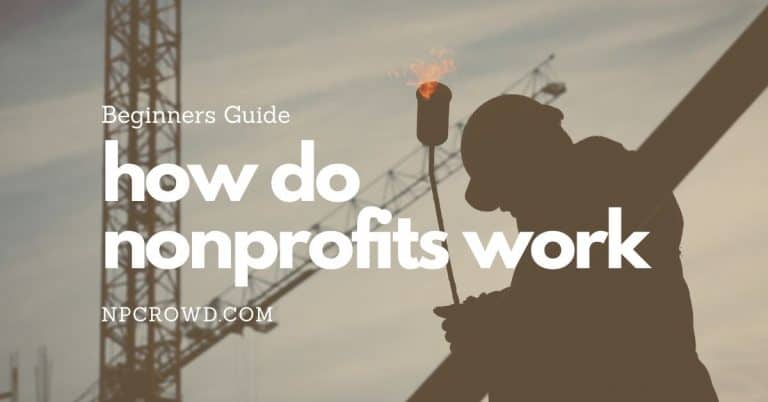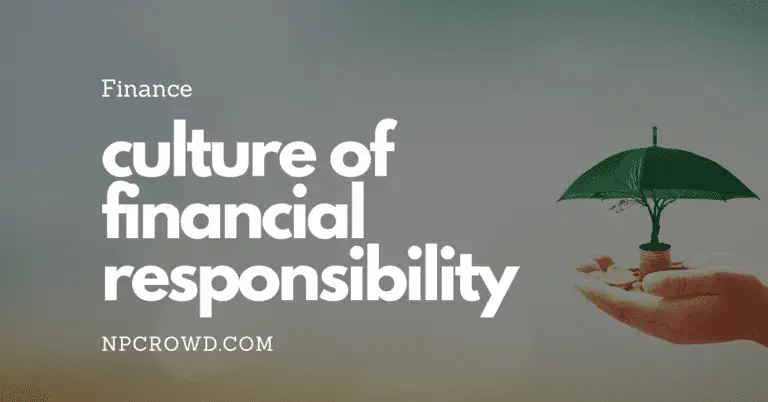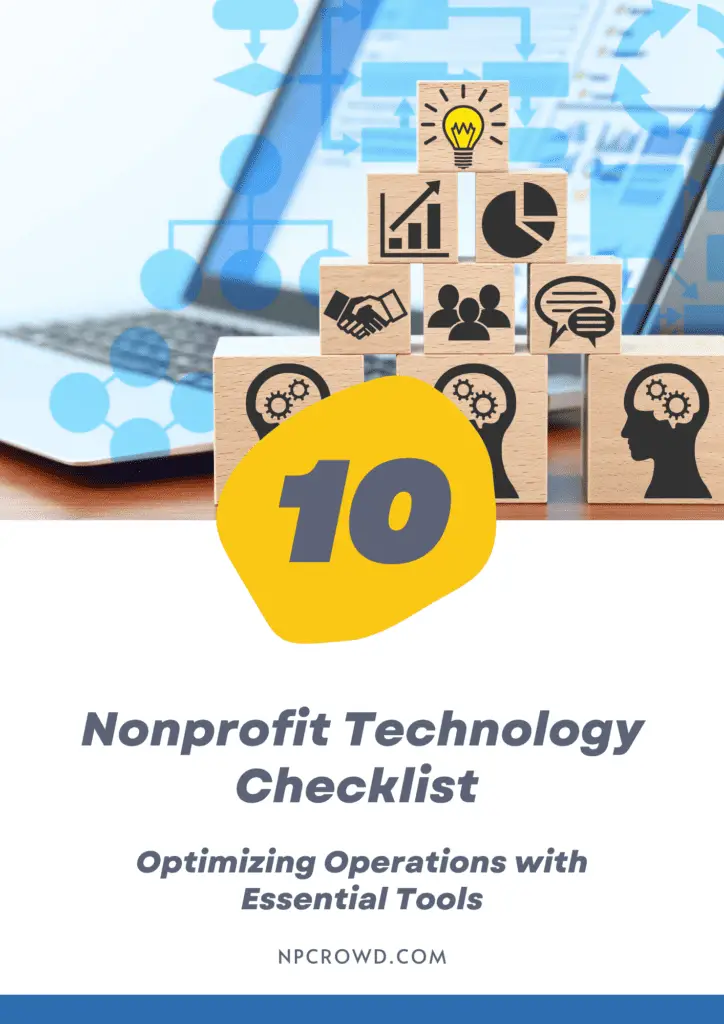15 Paid Nonprofit Job Titles and Descriptions in 2024
Disclaimer: This post may contain affiliate links. These links, if used and purchases made, we may earn a small commission. These affiliate programs do not impact the recommendations we make or the resources we refer you to. Our focus is on providing you the best resources for your nonprofit journey.
Nonprofits are all about improving people’s lives and the world around them. They do this by raising money to fund various projects, which could be anything from providing disaster relief in a developing country to helping homeless veterans find housing in America.Nonprofit organizations need people with different skillsets to help them succeed, so it is important for job seekers to know what they’re getting into before applying for these positions.
This article will go over the most common nonprofit job positions, titles, and descriptions that you can get paid for in nonprofits today, as well as some potential paths that might lead you there!
Executive Director
Depending on the organizational management structure, Executive Directors are responsible for overseeing the entire organization. This position is strategic and often requires an MBA, which will teach you how to manage people, foster teamwork among employees, make data-driven decisions using statistical techniques like regression analysis or time-series forecasting, and more.
An Executive Director will usually be the face of the organization and will communicate with donors, staff members, volunteers, the board of directors, or anyone else who is interested in what the nonprofit does.
Skills needed: Business administration knowledge, strong leadership skills, visionary thinking, executive-level communication abilities.
Potential paths: Public policy degree, Masters in Nonprofit Management, prior experience as a nonprofit board member or senior executive.
Related titles: President, Chief Executive Officer (CEO), Managing Director
Fundraising Director
This is one of the most important positions in a nonprofit organization because it’s responsible for securing money to fund projects and programs. They work with donors to identify their philanthropic goals and find out how the nonprofit can help them achieve those. This job requires networking, so you need excellent interpersonal skills to be an effective Fundraising Director.
This position usually has an annual fundraising goal (e.g. $250,000), and they’re accountable for meeting that target. The Fundraising Director has a lot of responsibility, but great benefits like cell phone/car stipends or performance bonuses for exceeding goals are common.
Skills needed: Donor relations experience, nonprofit fundraising software knowledge.
Potential paths: Sales leadership background, prior fundraising roles at nonprofits.
Related titles: Vice President of Development, Major Gifts Officer, Development Director
Director of Community Engagement
The Director of Community Engagement is responsible for connecting the organization to the public and vice versa. They create and execute community engagement plans to turn strategy into on-the-ground impact.
This person spends their time coordinating events, identifying partnerships to increase event impact, networking with organizations in similar fields or local leaders for new projects, and more.
If you love meeting new people and sharing your organization’s vision while managing event details, this could be a great nonprofit role for you.
Skills needed: Community advocacy experience, knowledge of nonprofit networks.
Potential paths: Special events management, prior nonprofit community outreach roles.
Related titles: Director of Outreach, Community Liaison, Client Advocacy Director
Finance & Accounting Manager
The Finance & Accounting Manager oversees the financial health of a nonprofit. They work with leadership to create budgets, identify funding gaps, ensure proper controls are in place, and that all transactions are recorded accurately.
They may also be responsible for budgeting staff time, procurement, and filing taxes. CFO roles require executive-level skills, while an Accounting Manager will need technical accounting skills and knowledge.
Skills needed: Nonprofit accounting software expertise, financial controls knowledge.
Potential paths: CPA license, prior experience as an accountant/controller/CFO.
Related titles: Chief Financial Officer (CFO), Controller, Bookkeeper
Director of Programs & Services
The Director of Programs & Services is responsible for the management, development, and evaluation of programs to support the nonprofit’s mission. This includes identifying needs, writing grant proposals, managing budgets, developing new initiatives to expand reach, and more.
They might also build partnerships with other organizations or conduct research to support programs. Strong leadership and program management skills are key.
Skills needed: Nonprofit program management experience, knowledge of program design and evaluation.
Potential paths: Social work master’s degree, years of nonprofit program management experience.
Related titles: Chief Programs Officer (CPO), Vice President of Programs, Program Manager
Director of Communications
The Director of Communications oversees all marketing, PR, and communications activities for the nonprofit. Main responsibilities include:
- Developing and executing communications plans across print, digital, social media, events, etc.
- Writing press releases, website content, blogs, newsletters, annual reports, and other materials
- Managing media relations and identifying PR opportunities
- Leading the creative team on branding, graphic design, photos/video
- Analyzing communications metrics and optimizing based on results
- Building relationships with key stakeholders like donors, partners, and the media
- Keeping senior leadership and board members updated on communications initiatives
Skills needed: Content writing/editing, digital marketing, project management, team leadership
Potential paths: Corporate communications roles, nonprofit marketing experience
Related titles: VP of Communications, Chief Communications Officer, MarComm Director
Special Events Manager
The Special Events Manager leads the strategy, planning, and execution of the nonprofit’s special events. Key duties include:
- Managing event budgets, timelines, vendor relationships
- Overseeing venue selection, rentals, decor, catering, A/V, etc.
- Coordinating event promotion through email, social media, press releases
- Managing online registration, name badges, check-in processes
- Recruiting and managing event staffing/volunteers
- Ensuring any required permits, licenses, insurance are in place
- Analyzing event ROI, satisfaction, and other metrics
Skills needed: Event planning/logistics, budgeting, vendor relations, project management
Potential paths: Corporate event planning, hospitality/event management degree
Related titles: Events Director, Meetings Manager, Conference Coordinator
Volunteer Coordinator
The Volunteer Coordinator spearheads volunteer recruitment, training, and management. Key responsibilities include:
- Developing new volunteer position descriptions
- Promoting volunteer opportunities through social media, events, etc.
- Interviewing and onboarding volunteer applicants
- Conducting background checks as needed
- Creating training programs to prepare volunteers
- Matching volunteers to programs based on skills and interests
- Scheduling volunteers and tracking hours/participation
- Recognizing top volunteers through awards/appreciation events
- Managing policies like reimbursements and conflict resolution
Skills needed: Recruiting, interviewing, training, leadership, organization
Potential paths: Human resources, teaching, nonprofit program management
Related titles: Director of Volunteers, Volunteer Engagement Manager
Program Manager
The Program Manager is responsible for the operations and success of specific programs. Key duties include:
- Managing program staffing, budgets, timelines
- Tracking program performance metrics and reporting on progress
- Ensuring program activities align with grant commitments
- Collaborating with development on grant applications and reports
- Communicating program impact to stakeholders
- Identifying areas for program enhancement and growth
- Providing coaching and development for program team members
Skills needed: Leadership, project management, budgeting, team development
Potential paths: Nonprofit program experience, project management roles
Related titles: Program Director, Program Lead, Program Coordinator
Technology Director
The Technology Director oversees all IT systems, infrastructure, and staff for a nonprofit. Key duties include:
- Managing IT team members and consultants/vendors
- Developing technology strategy aligned with business goals
- Overseeing software/application selection and implementation
- Ensuring IT policies and procedures are documented
- Managing IT budgets and assets
- Ensuring systems are operational, secure, backed-up
- Providing help desk, technical support for staff
- Training staff on using new technology tools and software
Skills needed: Leadership, IT management, budgeting, project management
Potential paths: IT consulting, corporate IT management roles
Related titles: Chief Technology Officer (CTO), VP of Information Technology
Grants Manager
The Grants Manager oversees the full grant application and management process. Key duties include:
- Researching new grant opportunities aligned with programs
- Working with programs on grant concept development
- Writing and assembling grant proposals and reports
- Ensuring all grant guidelines/requirements are met
- Managing grant tracking systems and calendars
- Acting as liaison between nonprofit and funders
- Providing grant compliance oversight and training
- Analyzing grant results and identifying improvements
Skills needed: Grantwriting, research, documentation, organization, analysis
Potential paths: Nonprofit fundraising roles, professional writing experience
Related titles: Grant Writer, Grant Coordinator, Grants Specialist
Human Resources Director
The HR Director leads the nonprofit’s human resources, talent acquisition, and culture functions. Key duties include:
- Developing HR policies, procedures, handbooks
- Overseeing recruiting, hiring, onboarding, and training
- Administering compensation, benefits, and payroll
- Ensuring legal/regulatory compliance related to HR
- Promoting diversity, equity, inclusion, and belonging
- Leading talent development and performance management
- Fostering positive organizational culture and employee engagement
- Guiding workforce planning, organizational change
Skills needed: HR expertise, leadership, relationship building, strategic planning
Potential paths: Corporate HR roles, nonprofit management experience
Related titles: Chief Human Resources Officer (CHRO), VP of People Operations
Board Member
Board members provide governance, guidance, and oversight for the nonprofit. Typical responsibilities include:
- Attending board meetings and serving on committees
- Reviewing and approving budgets, policies, plans
- Providing expertise, advice, and feedback to CEO
- Participating in strategic planning for the organization
- Representing the nonprofit externally and advocating its mission
- Helping with fundraising through personal donations, events, etc.
- Recruiting other high-impact board members
Skills needed: Leadership, governance, passion for the mission
Potential paths: Prior nonprofit board experience, corporate leadership roles
Related titles: Board Chair, Board Treasurer, Board Secretary
Operations Director
The Operations Director manages the day-to-day administrative, facility, and financial operations. Key duties include:
- Overseeing office administration, equipment, supplies
- Managing organization’s physical facilities and assets
- Coordinating with IT on systems and support needs
- Developing and monitoring budgets
- Managing accounting, reporting, audits, and controls
- Overseeing HR administration like payroll and compliance
- Creating operational policies and procedures
- Identifying areas for improved efficiency or cost savings
Skills needed: Leadership, operations management, budgeting, project management
Potential paths: Nonprofit operations roles, corporate office management
Related titles: Chief Operating Officer, Director of Operations, VP of Operations
Program Evaluation Manager
The Program Evaluation Manager measures program outcomes and impact. Key responsibilities include:
- Designing evaluation methodology, data collection tools
- Conducting qualitative and quantitative analysis on programs
- Interviewing program staff and stakeholders
- Observing program activities and processes
- Analyzing data to identify trends and insights
- Compiling findings into reports with recommendations
- Presenting evaluation results to leadership and funders
- Providing guidance on incorporating feedback into programs
Skills needed: Research, data analysis, communication, project management
Potential paths: Nonprofit program roles, market research experience
Related titles: Director of Evaluation, Assessment Coordinator, Research Analyst
Leadership and Management: The Right Person in the Right Seat
“Good doers don’t necessarily make good supervisors or managers.” It’s crucial to put the right person in the right seat, every time. The cost of a mismatch is too high. This doesn’t mean you can’t develop a great manager; it means you must be intentional about coaching, mentoring, and training new supervisors and managers. Don’t expect them to know what you haven’t taught. Assess if their experience aligns with your organization’s values and needs, and remember, sometimes coaching and training are still essential.
Rethinking Qualifications: Beyond a College Degree
I’ve learned through experience that a college degree isn’t always a prerequisite for success in senior and executive roles. Through demonstration of capabilities, continuous learning, and dedication, I led effectively in high-level positions before earning a degree. This path wasn’t easy, but it’s a common thread among some of my best hiring decisions. Consider the EOS Framework criteria: Do they get it, want it, and have the capacity to do it? If yes, they might be worth the investment, degree or no degree.
Executive Directors and Founders: Finding the Right Balance
Founders as Executive Directors can sometimes be less qualified for operational leadership compared to hiring an experienced external Executive Director. In such cases, it’s often more beneficial to keep the founder in a visionary role while bringing in professional expertise for the Executive Director position. This ensures that the organization is not held back by limitations in leadership and continues to evolve and grow under skilled guidance.
Conclusion
These are some of the most common paid nonprofit roles out there today. The required skills, possible career paths, and related job titles covered here can help you find the right nonprofit job opportunity and make a difference! Let me know in the comments if you have any other questions.







